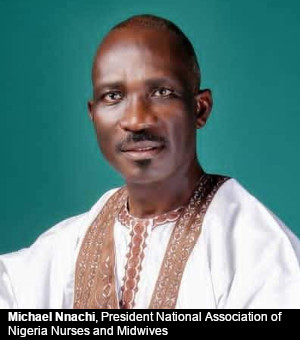By: Alfred Olufemi
Send to a friend
The details you provide on this page will not be used to send unsolicited email, and will not be sold to a 3rd party. See privacy policy.
[LAGOS] It took nearly three hours of sitting, queuing and loitering around Ikorodu General Hospital in Nigeria’s Lagos state before Hadijat Hassan, a retired civil servant, could get the attention of nurses on duty.
The 66-year-old has regularly attended the health facility for health checks since being diagnosed with diabetes nearly ten years ago. But since May, she says, she has had to endure long delays, often while suffering from excruciating pain in her legs as a result of the diabetes.
“I’m not as strong as I used to be,” Hassan told SciDev.Net.
“That’s old age for you. You can get there (the hospital) and meet like 50 people waiting to be attended to.”
“If one deliberately recruits and makes the country suffer because it lacks the required professionals, that’s a crime against humanity.”
Constantino Chiweng, Zimbabwe’s vice president and health minister
In Nigeria, each doctor has an average of 5,000 patients, whereas the OECD average is around 270 patients per doctor.
“They (staff at the hospital) said all of their nurses and doctors have been leaving for abroad,” said Hassan. “Just a few of them are left.”
A senior official at the hospital told SciDev.Net that the management gets notice of resignation from nurses and doctors almost every month.
“Many of them leave for the United States, Canada, United Kingdom and, most recently, Australia,” said the official who asked to remain anonymous.
The Nigerian Association of Nurses and Midwives has reported that Nigeria now has a nurse-to-patient-ratio of one nurse to about 1,160 patients, whereas the OECD average is one nurse to around 114 patients.

“Condition of service is very important. And social security. In the workplaces, people need to be assured that their employment is intact and entitlements are paid as of when due.
“Nurses are at the epicentre of healthcare service and should be taken care of to improve the system.”
According to the WHO’s estimates, the world will face a shortage of 10 million health and care workers by 2030. And the numbers are mostly in low-income countries, where health workers are leaving to find opportunities abroad.
Red list
This is despite the WHO’s introduction of a safeguard list to prevent rich countries from poaching healthcare workers from countries where health workers are in short supply.
The list was launched in 2020 to replace the list of countries with critical health workforce shortages contained in the WHO’s World Health Report, and the WHO plans to update it every three years.
The list includes Nigeria, Ghana, Zimbabwe and 34 other countries in the Africa region. Yet according to the UK’s Nursing and Midwifery Council, more than 7,000 Nigerian-trained nurses relocated to the United Kingdom between 2021 and 2022.
Data from the Ghana Registered Nurses’ and Midwives’ Association shows that nearly 4,000 nurses left the country in 2022, while in Zimbabwe, more than 4,000 health workers, including about 2,600 nurses, left the country in 2021 and 2022, the Zambian government revealed.
While the WHO does not prohibit recruitment of doctors from countries in the list, it discourages it.
The WHO recommends “that government-to-government health worker migration agreements be informed by health labour market analysis and the adoption of measures to ensure adequate supply of health workers in the source countries”.
Health sector organisations, however, say it appears to be ineffective in stemming the tide.
For instance, the British government currently flouts the safeguard list by recruiting from these countries. The latest data from the UK’s nursing regulator, the Nursing and Midwifery Council, show significant increases in recruitment of nurses from outside Europe, including countries on the WHO red list.
Nigeria sits in the top three of countries outside Europe, with over 3,000 joining the UK’s official register in 2022.
The RCN said those entering the UK nursing workforce included recruits from 14 countries on a red list of 47 that the UK Government had stipulated should not be actively recruited from.
“The UK list mirrors the World Health Organization, which says these 47 countries face the most pressing health workforce shortages and have been identified as having serious workforce challenges and must not be targeted for systematic recruitment by NHS or independent employers,” the RCN said in a statement when the data was released.
The union added that the increases have led to “concerns that UK governments are becoming heavily reliant” on countries with critical workforce shortages to fill nursing vacancies.
Nurses working in the UK, who spoke with SciDev.Net, say the British government only stops third parties such as agencies from recruiting but allows individuals to apply directly to the NHS or care homes of their choice.
In a revised code of practice issued earlier this year, the UK government confirmed that the embargo was not applicable to “direct application”.
“For the purpose of this code of practice, a ‘direct application’ is when an individual makes an application directly and on their own behalf to an employing organisation,” a clarification posted on the government website read.
However, the WHO, while updating the health workforce support and safeguards list in March, called on countries to respect the list.
“Health workers are the backbone of every health system, and yet 55 countries with some of the world’s most fragile health systems do not have enough and many are losing their health workers to international migration,” said WHO director-general Tedros Adhanom Ghebreyesus.
“WHO is working with these countries to support them to strengthen their health workforce, and we call on all countries to respect the provisions in the WHO health workforce support and safeguards list.”
Nurses dump qualification
Elizabeth Fadziso landed in Heathrow airport after spending about 20 hours flying from Harare to London. For the 30-year-old Zimbabwean nurse, the touch down in the UK in April signalled a fresh start.
She told SciDev.Net that she had hoped to work as an international nurse since she started her undergraduate nursing degree.
This dream, she said, was fuelled by the poor welfare condition of health workers in the country and deficit of advanced medical equipment.
Upon finishing her studies in 2020, she tried to apply for a certificate of good standing from the government, one of the documents required of nurses who want to work abroad. But she met a brick wall.
The Zimbabwean government, as part of efforts to curb the alarming migration of nurses, had stopped issuing the mandatory document. Doctors and nurses in Zimbabwe have long protested this rule that impedes their ability to leave the country.
Fadziso claimed she applied for the certificate in 2021 and was stuck in the process for more than a year.
Eventually, because she could not get the certificate, she had to forgo her qualification. Instead, she got a job working as a carer in a nursing home in Liverpool.
“I couldn’t wait any longer,” she said, adding: “I had to take the opportunity.
“At least, it is better than staying back at home. I’m closer to my dream now. More than ever.”
Fadziso is determined to pursue another nursing degree in the UK.
“It will take time but I don’t mind,” she said.



“They are taking other routes because remember UK is not only recruiting nurses it’s also recruiting care workers who do not need to have any form of registrations to work in the UK.”
He explained that when he left in 2021, the situation was intolerable, not only for nurses but all professionals working for the government of Zimbabwe.
“The condition of service was not good because salary adjustments were not done based on the cost of living,” he explained.
“As a result, many civil servants ended up struggling to make ends meet, many ended up struggling even to make it to work in some cases.
“So that alone prompted a number of people, not only myself, to start thinking and making moves of leaving our country.”
According to Mafukdize, his monthly pay totalled about US$150 when converted from Zimbabwe dollars. The amount, he said, was grossly insufficient to meet his needs.
“As you are aware our currency (Zimbabwean dollar) is not strong in purchasing power and you’ll always end up struggling to make ends meet.”
Asked if he would go back home if the situation changes, he said he would not.
Ghana’s recruitment ban
For nurses in Ghana, the situation is exacerbated by a government ban on the recruitment of civil servants,
The directive, announced by Ghanaian minister of finance Ken Ofori-Atta in 2022 as part of the 2023 budget, aimed to help the government navigate its fiscal crisis and took effect from January this year.
The president of Ghana Registered Nurses’ and Midwives’ Association, Perpetual Ofori-Ampofo, urged the government to consider the inadequate number of health workers in the country when implementing the hiring “freeze”.
“I wish to state emphatically that the nursing and midwifery workforce as we speak is not adequate and, therefore, we need those who have completed nursing schools to be employed to support health care delivery,” she said at a public function.
Daniela (not her real name), a nurse working in a public health facility in Ghana’s Volta region, lamented how many of her colleagues have left and were not being replaced. “People are leaving but the government has stopped [recruiting],” she told SciDev.Net.
“It is we that are left that are doing the job.”
“If everyone is leaving, there won’t be enough people left,” she said, accusing some of her colleagues of being selfish.
Although she had only worked as a nurse for two years, Daniela said she did not see herself leaving Ghana anytime soon, noting that she is content with her monthly salary of about 2,500 Cedis (US$223).
“I have been pressured by even my family members,” she added. “They ask why I am not doing what others are doing.
“Leaving doesn’t solve the problem, it compounds it. If you are leaving, just leave for the good reasons. ‘I want to experience something new and learn something new’, no problem. But if you want to go and earn more, then that’s a problem.”
Policies to end brain drain
Governments across Sub-Saharan Africa have been pushing for various legislations to curb the brain drain.
In April, Nigeria’s House of Representatives, or lower chamber, passed the Medical and Dental Practitioners Act (Amendment) Bill, 2022, for the second reading.
The bill, which is yet to be passed by the senate – the upper chamber – seeks to make it compulsory for graduates in medical and dental fields to render services within Nigeria for five years before being granted full licence.
The lawmaker who sponsored the bill, Ganiyu Johnson, said the move was to curb the mass exodus of medical professionals from the country.



“That must be taken seriously.”
Although no legislation has been passed to back this, stakeholders and rights activists have kicked back against the measures, which many claim may be counter-productive.



Former Nigerian lawmaker Shehu Sani says health workers will only be retained if their prospects in the country improve.
“Doctors and nurses are leaving for greener pastures in the West and the Middle East,” he said adding: “Do we need a law to stop them or do we need to improve on their working conditions in order to keep them?”
This piece was produced by SciDev.Net’s Sub-Saharan Africa English desk.
















